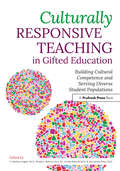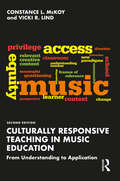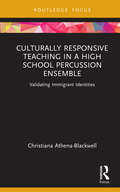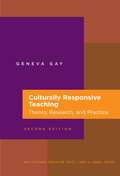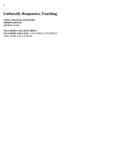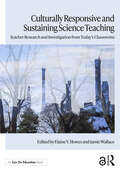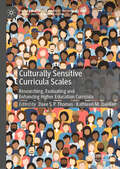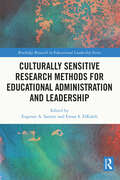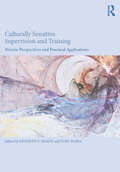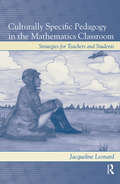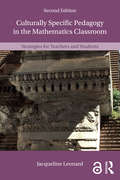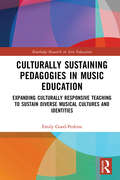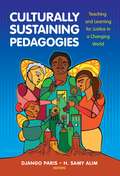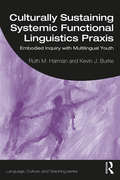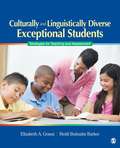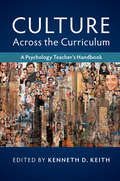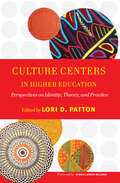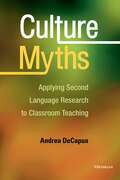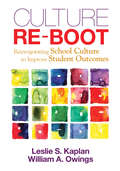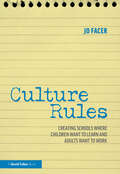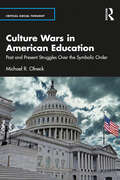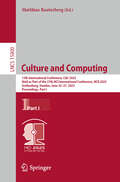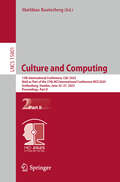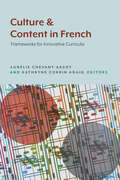- Table View
- List View
Culturally Responsive Teaching in Gifted Education: Building Cultural Competence and Serving Diverse Student Populations
by Wendy A. Behrens Cecelia Boswell Joy Lawson Davis C. Matthew FugateCulturally Responsive Teaching in Gifted Education is a professional learning tool for practitioners who are working to create more culturally responsive school and classroom environments. This book:Focuses on gifted and talented students from special populations, including those who are culturally, linguistically, and economically diverse.Is presented as a collection of essays written by educational advocates.Aims to increase the cultural competence of teachers and school leaders.Is organized in three sections: Culturally Responsive Practices; Race, Ethnicity, and Culture; and Gender, Sex, and Sense of Self.Provides readers with personal insights into the implicit biases that exist within the educational system and gifted programs.Each chapter illustrates the lived experiences of students from special populations and includes reflection questions for continued conversations and planning. Finally, an Educator Inventory is provided that tasks educators with reflecting on their own personal implicit biases and classroom practices related to the diverse populations of gifted and talented students in our schools.
Culturally Responsive Teaching in Music Education: From Understanding to Application
by Vicki R. Lind Constance L. McKoyCulturally Responsive Teaching in Music Education: From Understanding to Application, Second Edition, presents teaching methods that are responsive to how different culturally specific knowledge bases impact learning. It offers a pedagogy that recognizes the importance of including students’ cultural references in all aspects of learning. Designed as a resource for teachers of undergraduate and graduate music education courses, the book provides examples in the context of music education, with theories presented in Part I and a review of teaching applications in Part II. Culturally Responsive Teaching in Music Education is an effort to answer the question: How can I teach music to my students in a way that is culturally responsive? This book serves several purposes, by: Providing practical examples of transferring theory into practice in music education. Illustrating culturally responsive pedagogy within the classroom. Demonstrating the connection of culturally responsive teaching to the school and larger community. This Second Edition has been updated and revised to incorporate recent research on teaching music from a culturally responsive lens, new data on demographics, and scholarship on calls for change in the music curriculum. It also incorporates an array of new perspectives from music educators, administrators, and pre-service teachers—drawn from different geographic regions—while addressing the impact of the Covid-19 pandemic and the 2020 social justice protests.
Culturally Responsive Teaching in a High School Percussion Ensemble: Validating Immigrant Identities (Routledge Focus on Music Education: Culturally Responsive Teaching)
by Christiana Athena-BlackwellCulturally Responsive Teaching in a High School Percussion Ensemble: Validating Immigrant Identities addresses themes of immigration, identity, and culturally responsive teaching in music education using a deep case study of Brazilian samba music in the context of a high school percussion ensemble.Through an in-depth ethnographic study of the World Percussion Ensemble at Somerville High School, Massachusetts, and how it was renovated by a progressive music program director, the author demonstrates how a program can respond to the cultures and needs of immigrant students by creating a unique intercultural community within the classroom. The book recognizes key components in the process of immigrant social integration: (1) music education can help facilitate immigrant students’ adjustment to a new culture as they negotiate a hybrid identity. (2) The inclusive nature of samba percussion music encourages communication, cooperation, and empathy, helping students to build life skills. (3) By blending rhythms from their countries of origin with a pop song of choice for their final composition, the students create their own interculture.Deriving from culturally responsive music teaching practices, this study will inspire music teachers and music education researchers to transfer some of the methods to center students’ languages, identities, and cultural references in their curricula.
Culturally Responsive Teaching: Theory, Research and Practice Second Edition
by Geneva GayCombining insights from multicultural education theory and research with real-life classroom stories, Gay demonstrates that all students will perform better on multiple measures of achievement when teaching is filtered through their own cultural experiences.
Culturally Responsive Teaching: Theory, Research, And Practice (Multicultural Education Ser.)
by Geneva GayGeneva Gay is renowned for her contributions to multicultural education, particularly as it relates to curriculum design, professional learning, and classroom instruction. Gay has made many important revisions to keep her foundational, award-winning text relevant for today’s diverse student population, including: new research on culturally responsive teaching, a focus on a broader range of racial and ethnic groups, and consideration of additional issues related to early childhood education. Combining insights from multicultural education theory with real-life classroom stories, this book demonstrates that all students will perform better on multiple measures of achievement when teaching is filtered through students’ own cultural experiences. This perennial bestseller continues to be the go-to resource for teacher professional learning and preservice courses.
Culturally Responsive and Sustaining Science Teaching: Teacher Research and Investigation from Today's Classrooms
by Elaine V. Howes Jamie WallaceHow can research into culturally responsive and sustaining education (CRSE) inform and transform science teaching and learning? What approaches might teachers use to study CRSE in their classrooms? What are teachers learning from their research that might be transferable to other classrooms and schools?In this practical resource, teacher researchers from the Culturally Responsive and Sustaining Education Professional Learning Group based in New York City provide insights for educators on how to address complex educational and sociocultural issues in the science classroom. Highlighting wide-ranging and complex problems such as the COVID-19 pandemic and racial injustice and how they affect individual science instruction settings, with a particular focus on urban and high-need school environments, chapters examine and describe what CRSE is and means for science teaching.Through individual and collaborative research studies, chapters help readers understand various approaches to developing and implementing CRSE strategies in their classrooms and promote students’ identification with and affinity for science. Teachers describe the questions driving their investigations, data, and findings, and reflect on their roles as agents of change. Chapters also feature discussion and reflection questions, and include examples of assignments, protocols, and student work that teachers have piloted in their classes.This book is ideal for pre-service and in-service science teachers and teacher educators across grade levels. It provides support for professional learning activities, as well as undergraduate and graduate teacher education courses. It may be particularly useful in science methods, multicultural education; and diversity, equity, and inclusion courses with a focus on CRSE. This book not only defines one group’s approach to CRSE in science education, but also takes the next step to show how CRSE can be applied directly to the science classroom.
Culturally Sensitive Curricula Scales: Researching, Evaluating and Enhancing Higher Education Curricula (Palgrave Studies in Race, Inequality and Social Justice in Education)
by Kathleen M. Quinlan Dave S. P. ThomasThis edited book outlines the conceptualization, development, and use of a novel set of Culturally Sensitive Curricula Scales (CSCS) as an instrument for students to rate the cultural sensitivity of their curriculum, as well as a self-reflection tool for educators to use in order to make curriculum changes. The book provides insights from the use of the tools collectively and individually in a range of higher education institutions across the UK, to inform curriculum revision nationally and internationally.
Culturally Sensitive Research Methods for Educational Administration and Leadership (Routledge Research in Educational Leadership)
by Eugenie A. Samier Eman S. ElkalehThis book explores the multicultural and non-Western contexts behind the approaches, problems, and issues that arise in research methodologies when used in relation to educational administration and leadership. This volume argues that increasing internationalisation and diversity of the field requires research methods that better reflect the values, cultures, political systems, and conditions of non-Western communities and countries. Discussing the research methods, data collection practices, interpretive approaches, and research ethics that produce more accurate and authentic results, the book looks at a number of theoretical frameworks and epistemological approaches that inform the development of such methodologies. Traditional methods like sharing circles and storytelling are explored, as well as an examination of ‘social space’ in designing methodology aimed at ‘spatial justice’ and an exploration of methods for Indigenous communities in East Asia. A valuable resource for researchers, scholars, and students with an interest in multicultural education, the book will also appeal to academics interested in race, ethics, and educational research methods more broadly.
Culturally Sensitive Supervision and Training: Diverse Perspectives and Practical Applications
by Kenneth V. Hardy Toby BobesCulturally Sensitive Supervision and Training: Diverse Perspectives and Practical Applications is a comprehensive text that exposes readers to an array of culturally competent approaches to supervision and training. The book consists of contributions from a culturally and professionally diverse group of scholars and clinicians who have been on the frontline of providing culturally competent supervision and training in a variety of settings. Many of the invited contributing authors have developed innovative clinical-teaching strategies for skillfully and effectively incorporating issues of culture into both the classroom and the consulting room. A major portion of the book will provide the reader with an insider’s view of these strategies as well as a plan for implementation, with one chapter devoted to experiential exercises to enhance cultural sensitivity in supervision and training. The text is intended for use in supervision courses, but trainers and supervisors will also find it essential to their work.
Culturally Specific Pedagogy in the Mathematics Classroom: Strategies for Teachers and Students
by Jacqueline Leonard"Culturally Specific Pedagogy in the Mathematic Classroom offers a wide variety of conceptual and curricular resources for teachers interested in teaching mathematics in a way that challenges stratification based upon race, class, gender and other forms of oppression that students face in today�s world�. With the publication of this book, all teachers will have available to them instructional strategies in mathematics for meeting the academic needs of culturally diverse students. They will have an explanation of the linkage between culture and students� mathematical cognition and problem solving�. The ease in which Leonard brings the reader along, and the caring way she tells a story about making mathematics a fun and social justice experience makes for an exciting learning opportunity for all students and teachers." Carl A. Grant, University Wisconsin-Madison, United States, From the Foreword "Mathematics educators are in a period of deep concern about our ability to educate all students in mathematics. Most students of color do not have the opportunities to fully learn mathematics. Nothing more important can be done for these students and their teachers than to publish this book addressing the miseducation of these students and offering a way to change what we are doing." Carol E. Malloy, University of North Carolina-Chapel Hill, United States This compelling text advocates the use of culturally specific pedagogy to enhance the mathematics instruction of diverse students. It accomplishes this by making clear the link between research and practice and offering lesson templates that teachers can use with ethnically and culturally diverse students and with females. Specifically, the text draws on sociocultural theory and research on culture and mathematics cognition to focus on three goals: using qualitative research to extend the literature on culturally based education to African American and Latina/o c
Culturally Specific Pedagogy in the Mathematics Classroom: Strategies for Teachers and Students
by Jacqueline LeonardAdvocating for the use of culturally specific pedagogy to enhance the mathematics instruction of diverse students, this revised second edition offers a wide variety of conceptual and curricular resources for teaching mathematics in a way that combats and confronts the forms of oppression that students face today. Addressing stratification based on race, class, and gender, Leonard offers lesson templates that teachers can use with ethnically and culturally diverse students and makes the link between research and practice. Connecting cutting-edge and emerging technologies to culturally specific pedagogy, the second edition features new chapters on mathematics and social justice, robotics, and spatial visualization. Applying a more expansive focus, the new edition discusses current movements such as Black Lives Matter and incorporates examples of rural and tribal students to paint a broader picture of what culturally rich mathematics classrooms actually look like. The text builds on sociocultural theory and research on culture and mathematics cognition to extend the literature and better understand minority students’ goals and learning needs. Including new discussion questions and new examples, lessons, and vignettes of integrating culture in the mathematics classroom, this book employs pedagogical research to field-test new instructional methods for culturally diverse and female students.
Culturally Sustaining Pedagogies in Music Education: Expanding Culturally Responsive Teaching to Sustain Diverse Musical Cultures and Identities (Routledge Research in Arts Education)
by Emily Good-PerkinsThis volume problematizes the historic dominance of Western classical music education and posits culturally sustaining pedagogy (CSP) as a framework through which music curricula can better serve increasingly diverse student populations. By detailing a qualitative study conducted in an urban high school in the United States, the volume illustrates how traditional approaches to music education can inhibit student engagement and learning. Moving beyond culturally responsive teaching, the volume goes on to demonstrate how enhancing teachers’ understanding of alternative musical epistemologies can support them in embracing CSP in the music classroom. This new theoretical and pedagogical framework reconceptualizes current practices to better sustain the musical cultures of the minoritized. This text will benefit researchers, academics, and educators with an interest in music education, multicultural education, and urban education more broadly. Those specifically interested in ethnomusicology and classroom practice will also benefit from this book.
Culturally Sustaining Pedagogies: Teaching and Learning for Justice in a Changing World (Language and Literacy)
by H. Samy Alim Django PariCulturally Sustaining Pedagogies raises fundamental questions about the purpose of schooling in changing societies. Bringing together an intergenerational group of prominent educators and researchers, this volume engages and extends the concept of culturally sustaining pedagogy (CSP)―teaching that perpetuates and fosters linguistic, literate, and cultural pluralism as part of schooling for positive social transformation. The authors propose that schooling should be a site for sustaining the cultural practices of communities of color, rather than eradicating them. Chapters present theoretically grounded examples of how educators and scholars can support Black, Indigenous, Latinx, Asian/Pacific Islander, South African, and immigrant students as part of a collective movement towards educational justice in a changing world.
Culturally Sustaining Systemic Functional Linguistics Praxis: Embodied Inquiry with Multilingual Youth (Language, Culture, and Teaching Series)
by Kevin J. Burke Ruth M. HarmanBy introducing a framework for culturally sustaining Systemic Functional Linguistics (SFL) praxis, Harman, Burke and other contributing authors guide readers through a practical and analytic exploration of youth participatory work in classroom and community settings. Applying an SFL lens to critical literacy and schooling, this book articulates a vision for youth learning and civic engagement that focuses on the power of performance, spatial learning, community activism and student agency. The book offers a range of research-driven, multimodal resources and methods for teachers to encourage students’ meaning-making. The authors share how teachers and community activists can interact and support diverse and multilingual youth, fostering a dynamic environment that deepens inquiry of the arts and disciplinary area of knowledge. Research in this book provides a model for collaborative engagement and community partnerships, featuring the voices of students and teachers to highlight the importance of agency and action research in supporting literacy learning and transformative inquiry. Demonstrating theoretically and practically how SFL praxis can be applied broadly and deeply in the field, this book is suitable for preservice teachers, teacher educators, graduate students and scholars in bilingual and multilingual education, literacy education and language policy.
Culturally and Linguistically Diverse Exceptional Students: Strategies for Teaching and Assessment
by Elizabeth A. Grassi Heidi Bulmahn BarkerConnects theory to practice while presenting foundational teaching and assessment practices for CLDE students. Practical in nature and designed with an eye toward universal design for learning, this text brings together foundational information from special education and ELL/bilingual fields to help teachers address the specific needs of culturally and linguistically diverse exceptional (CLDE) students. Key Features: Case studies from teachers, students, and parents describe the personal challenges of CLDE students. Authentic student language examples illustrate the concepts described and make practical connections to the research discussed Activities for further understanding allow students to review key points and connects theory to classroom practice. Ancillaries available at www. sagepub. com/grassi Password-protected instructor resources include PowerPoint lecture slides, sample syllabi, and Web resources. An open-access student study site provides online video clips of teachers in action, which exemplify different strategies and are accompanied by critical thinking questions from the authors. Students can also access additional case studies and relevant SAGE journal articles from the study site.
Culture Across the Curriculum: A Psychology Teacher's Handbook (Culture And Psychology )
by Kenneth D. KeithCulture Across the Curriculum provides a useful handbook for psychology teachers in the major subfields of the discipline. From introductory psychology to the foundations in such areas as social psychology, statistics, research methods, memory, cognition, personality, and development, to such specialized courses as language, sexuality, and peace psychology, there is something here for virtually every teacher of psychology. In addition to discussions of the rationale for inclusion of cultural context in their areas of specialization, these experienced teachers also offer advice and ideas for teaching exercises and activities to support the teaching of a psychology of all people.
Culture Centers in Higher Education: Perspectives on Identity, Theory, and Practice
by Lori D. PattonAre cultural centers ethnic enclaves of segregation, or safe havens that provide minority students with social support that promotes persistence and retention?Though Black cultural centers boast a 40-year history, there is much misinformation about them and the ethnic counterparts to which they gave rise. Moreover, little is known about their historical roots, current status, and future prospects. The literature has largely ignored the various culture center models, and the role that such centers play in the experiences of college students. This book fills a significant void in the research on ethnic minority cultural centers, offers the historic background to their establishment and development, considers the circumstances that led to their creation, examines the roles they play on campus, explores their impact on retention and campus climate, and provides guidelines for their management in the light of current issues and future directions.In the first part of this volume, the contributors provide perspectives on culture centers from the point of view of various racial/ethnic identity groups, Latina/o, Asian, American Indian, and African American. Part II offers theoretical perspectives that frame the role of culture centers from the point of view of critical race theory, student development theory, and a social justice framework. Part III focuses specifically on administrative and practice-oriented themes, addressing such issues as the relative merits of full- and part-time staff, of race/ethnic specific as opposed to multicultural centers, relations with the outside community, and integration with academic and student affairs to support the mission of the institution. For administrators and student affairs educators who are unfamiliar with these facilities, and want to support an increasingly diverse student body, this book situates such centers within the overall strategy of improving campus climate, and makes the case for sustaining them. Where none as yet exist, this book offers a rationale and blueprint for creating such centers. For leaders of culture centers this book constitutes a valuable tool for assessing their viability, improving their performance, and ensuring their future relevance – all considerations of increased importance when budgets and resources are strained. This book also provides a foundation for researchers interested in further investigating the role of these centers in higher education.
Culture Centers in Higher Education: Perspectives on Identity, Theory, and Practice
by Lori D. PattonAre cultural centers ethnic enclaves of segregation, or safe havens that provide minority students with social support that promotes persistence and retention?Though Black cultural centers boast a 40-year history, there is much misinformation about them and the ethnic counterparts to which they gave rise. Moreover, little is known about their historical roots, current status, and future prospects. The literature has largely ignored the various culture center models, and the role that such centers play in the experiences of college students. This book fills a significant void in the research on ethnic minority cultural centers, offers the historic background to their establishment and development, considers the circumstances that led to their creation, examines the roles they play on campus, explores their impact on retention and campus climate, and provides guidelines for their management in the light of current issues and future directions.In the first part of this volume, the contributors provide perspectives on culture centers from the point of view of various racial/ethnic identity groups, Latina/o, Asian, American Indian, and African American. Part II offers theoretical perspectives that frame the role of culture centers from the point of view of critical race theory, student development theory, and a social justice framework. Part III focuses specifically on administrative and practice-oriented themes, addressing such issues as the relative merits of full- and part-time staff, of race/ethnic specific as opposed to multicultural centers, relations with the outside community, and integration with academic and student affairs to support the mission of the institution. For administrators and student affairs educators who are unfamiliar with these facilities, and want to support an increasingly diverse student body, this book situates such centers within the overall strategy of improving campus climate, and makes the case for sustaining them. Where none as yet exist, this book offers a rationale and blueprint for creating such centers. For leaders of culture centers this book constitutes a valuable tool for assessing their viability, improving their performance, and ensuring their future relevance – all considerations of increased importance when budgets and resources are strained. This book also provides a foundation for researchers interested in further investigating the role of these centers in higher education.
Culture Myths: Applying Second Language Research to Classroom Teaching
by Andrea DeCapuaCulture Myths is intended for all educators who work with culturally and linguistically diverse students of any age and at any level. The intention of the title is to convey the idea that one group of people holds culturally derived beliefs and makes assumptions about another group of people who holds diverse beliefs and assumptions; each group’s assumptions are formed in different cultural contexts.
Culture Re-Boot: Reinvigorating School Culture to Improve Student Outcomes
by Leslie S. Kaplan William A. OwingsYour start up menu for super-charged culture change School culture is the invisible thread woven throughout your school that defines everything from dress codes to student success. Packed with workable strategies and real-life stories of culture re-boots, this practical handbook for change shows you how to: Be the transformational leader your school needs to reinvigorate your school culture Establish a student-centered learning culture focused on student outcomes Engage teachers in culture-focused leadership teams to support teacher and student learning Get parents and community on-board to collaborate for student achievement Connect professional development and school culture for maximum results
Culture Rules: Creating Schools Where Children Want to Learn and Adults Want to Work
by Jo FacerSchool culture is unarguably central to a school’s success or failure. While there is no single "correct" school culture, there are lessons to be learned. Culture Rules examines the factors that create an environment where students want to learn, and adults want to teach. Culture Rules explores staff culture, student culture, team building, establishing and maintaining norms inside and outside the classroom, and lessons learned from top-performing schools. By sharing her personal journey in school leadership, Jo Facer: explores the different factors that can affect a school’s culture; considers hot topics such as teacher workload, discipline, marking, CPD and shows how these can influence a school’s culture and success; and includes real case studies to show how schools have developed a strong culture and the impact on performance. Full of practical, sustainable ideas for schools to implement in the short and long term, this is essential reading for all school leaders in primary and secondary schools looking to build a great school culture in their organisations.
Culture Wars in American Education: Past and Present Struggles Over the Symbolic Order (Critical Social Thought)
by Michael R. OlneckCulture Wars in American Education: Past and Present Struggles Over the Symbolic Order radically questions norms and values held within US Education and analyses why and how culture wars in American education are intense, consequential, and recurrent.Applying the concept of “symbolic order,” this volume elaborates ways in which symbolic representations are used to draw boundaries, allocate status, and legitimate the exercise of authority and power within American schooling. In particular, the book illustrates the “terms of inclusion” by which full membership in the national community is defined, limited, and contested. It suggests that repetitive patterns in the symbolic order, for example, the persistence of the representation of an individualistic basis of American society and polity, constrain the reach of progressive change. The book examines the World War I era Americanization movement, the World War II era Intercultural Education movement, the late-twentieth-century Multicultural Education movement, continuing right-wing assaults on Ethnic Studies and Critical Race Theory in the first decades of the twenty-first century, and historical and contemporary conflicts over the incorporation of languages other than Standard English into approved instructional approaches.In the context of continuing culture wars in the United States and across the globe, this book will be of interest to graduate students and scholars in critical studies of education, history of education, sociology of education, curriculum theory, Multicultural Education, and comparative education, as well as to educators enmeshed in contemporary tensions and conflicts.
Culture and Computing: 13th International Conference, C&C 2025, Held as Part of the 27th HCI International Conference, HCII 2025, Gothenburg, Sweden, June 22–27, 2025, Proceedings, Part I (Lecture Notes in Computer Science #15800)
by Matthias RauterbergThis book constitutes the refereed proceedings of the 13th International Conference on Culture and Computing, held as part of the 27th International Conference, HCI International 2025, which took place in Gothenburg, Sweden, during June 22–27, 2025. The total of 1430 papers and 355 posters included in the HCII 2025 proceedings was carefully reviewed and selected from 7972 submissions. Two volumes of the HCII 2025 proceedings are dedicated to this year&’s edition of the C&C conference: Part I focuses on topics related to Interactive Cultural Experiences and Traditional Craft Preservation, AI-empowered Art and Computational Creativity, and Virtual, Augmented, and Mixed Reality for Cultural Heritage. Part II focuses on topics related to Interactive Media, Embodied Cognition, and Digital Communication in Cultural Experiences; Health and Well-Being; and Bie-Modernism and Cultural Computing.
Culture and Computing: 13th International Conference, C&C 2025, Held as Part of the 27th HCI International Conference, HCII 2025, Gothenburg, Sweden, June 22–27, 2025, Proceedings, Part II (Lecture Notes in Computer Science #15801)
by Matthias RauterbergThis book constitutes the refereed proceedings of the 13th International Conference on Culture and Computing, held as part of the 27th International Conference, HCI International 2025, which took place in Gothenburg, Sweden, during June 22–27, 2025. The total of 1430 papers and 355 posters included in the HCII 2025 proceedings was carefully reviewed and selected from 7972 submissions. Two volumes of the HCII 2025 proceedings are dedicated to this year&’s edition of the C&C conference: Part I focuses on topics related to Interactive Cultural Experiences and Traditional Craft Preservation, AI-empowered Art and Computational Creativity, and Virtual, Augmented, and Mixed Reality for Cultural Heritage. Part II focuses on topics related to Interactive Media, Embodied Cognition, and Digital Communication in Cultural Experiences; Health and Well-Being; and Bie-Modernism and Cultural Computing.
Culture and Content in French: Frameworks for Innovative Curricula
by Aurélie Chevant-AksoyInstructors in today’s language classrooms face the challenge of preparing globally competent and socially responsible students with transcultural aptitude. As classroom content shifts toward communication, collaboration, and problem solving across cultural, racial, and linguistic boundaries, the teaching of culture is an integral part of foreign language education. This volume offers nontraditional approaches to teaching culture in a complex time when the internet and social networks have blurred geographical, social, and political borders.The authors offer practical advice about teaching culture with kinesthetics, music, improvisation, and communication technologies for different competency levels.The chapters also explore multi-literacies, project-based learning, and discussions on teaching culture through literature, media, and film.The appendices share examples of course syllabi, specific course activities, and extracurricular projects that explore culinary practices, performing arts, pop culture, geolocation, digital literacy, journalism, and civic literacy.
